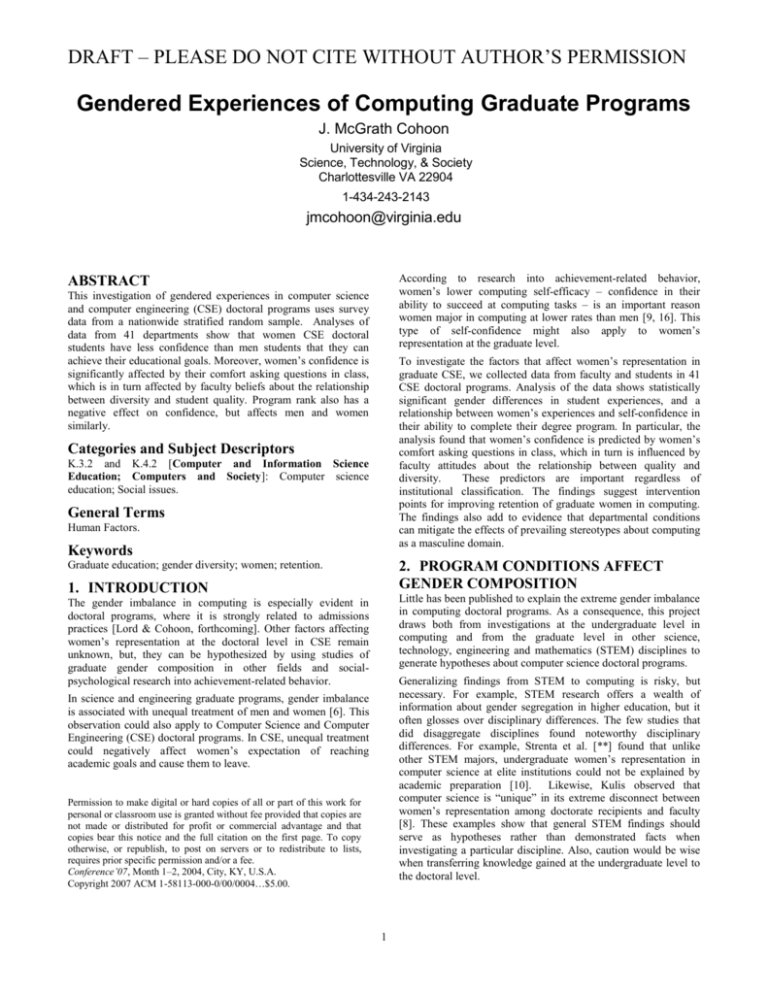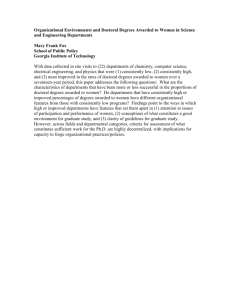Gendered Experiences of Computing Graduate Programs
advertisement

DRAFT – PLEASE DO NOT CITE WITHOUT AUTHOR’S PERMISSION Gendered Experiences of Computing Graduate Programs J. McGrath Cohoon University of Virginia Science, Technology, & Society Charlottesville VA 22904 1-434-243-2143 jmcohoon@virginia.edu According to research into achievement-related behavior, women’s lower computing self-efficacy – confidence in their ability to succeed at computing tasks – is an important reason women major in computing at lower rates than men [9, 16]. This type of self-confidence might also apply to women’s representation at the graduate level. ABSTRACT This investigation of gendered experiences in computer science and computer engineering (CSE) doctoral programs uses survey data from a nationwide stratified random sample. Analyses of data from 41 departments show that women CSE doctoral students have less confidence than men students that they can achieve their educational goals. Moreover, women’s confidence is significantly affected by their comfort asking questions in class, which is in turn affected by faculty beliefs about the relationship between diversity and student quality. Program rank also has a negative effect on confidence, but affects men and women similarly. To investigate the factors that affect women’s representation in graduate CSE, we collected data from faculty and students in 41 CSE doctoral programs. Analysis of the data shows statistically significant gender differences in student experiences, and a relationship between women’s experiences and self-confidence in their ability to complete their degree program. In particular, the analysis found that women’s confidence is predicted by women’s comfort asking questions in class, which in turn is influenced by faculty attitudes about the relationship between quality and diversity. These predictors are important regardless of institutional classification. The findings suggest intervention points for improving retention of graduate women in computing. The findings also add to evidence that departmental conditions can mitigate the effects of prevailing stereotypes about computing as a masculine domain. Categories and Subject Descriptors K.3.2 and K.4.2 [Computer and Information Science Education; Computers and Society]: Computer science education; Social issues. General Terms Human Factors. Keywords 2. PROGRAM CONDITIONS AFFECT GENDER COMPOSITION Graduate education; gender diversity; women; retention. 1. INTRODUCTION Little has been published to explain the extreme gender imbalance in computing doctoral programs. As a consequence, this project draws both from investigations at the undergraduate level in computing and from the graduate level in other science, technology, engineering and mathematics (STEM) disciplines to generate hypotheses about computer science doctoral programs. The gender imbalance in computing is especially evident in doctoral programs, where it is strongly related to admissions practices [Lord & Cohoon, forthcoming]. Other factors affecting women’s representation at the doctoral level in CSE remain unknown, but, they can be hypothesized by using studies of graduate gender composition in other fields and socialpsychological research into achievement-related behavior. Generalizing findings from STEM to computing is risky, but necessary. For example, STEM research offers a wealth of information about gender segregation in higher education, but it often glosses over disciplinary differences. The few studies that did disaggregate disciplines found noteworthy disciplinary differences. For example, Strenta et al. [**] found that unlike other STEM majors, undergraduate women’s representation in computer science at elite institutions could not be explained by academic preparation [10]. Likewise, Kulis observed that computer science is “unique” in its extreme disconnect between women’s representation among doctorate recipients and faculty [8]. These examples show that general STEM findings should serve as hypotheses rather than demonstrated facts when investigating a particular discipline. Also, caution would be wise when transferring knowledge gained at the undergraduate level to the doctoral level. In science and engineering graduate programs, gender imbalance is associated with unequal treatment of men and women [6]. This observation could also apply to Computer Science and Computer Engineering (CSE) doctoral programs. In CSE, unequal treatment could negatively affect women’s expectation of reaching academic goals and cause them to leave. Permission to make digital or hard copies of all or part of this work for personal or classroom use is granted without fee provided that copies are not made or distributed for profit or commercial advantage and that copies bear this notice and the full citation on the first page. To copy otherwise, or republish, to post on servers or to redistribute to lists, requires prior specific permission and/or a fee. Conference’07, Month 1–2, 2004, City, KY, U.S.A. Copyright 2007 ACM 1-58113-000-0/00/0004…$5.00. 1 DRAFT – PLEASE DO NOT CITE WITHOUT AUTHOR’S PERMISSION women’s confidence in their ability to complete their CSE doctoral program. When explaining gender segregation in higher education, some researchers argue that men and women respond differently to particular conditions. Although men may persist in academic programs where the teaching is poor [11] or the communication style is impersonal [1], women are less likely to do so. Some [11] suggest that socialization, inherent characteristics, or available alternatives could lead women to leave programs in which they are not comfortable. The real issue, however, is not whether responses to conditions are gendered, because even in the same department men and women are present under different circumstances. Gender roles and gender schemas create different contexts for men and women’s experience of computing. Expectations and stereotypes about interests, abilities, and appropriate behaviors all contribute to this gendered context. These gender schemas, together with social structures and discipline cultures that glorify total work commitment, continually nudge men and women toward gender “appropriate” fields. (See references 14, 8, 12 for further explanation and evidence.) 1. Program rank is negatively associated with confidence. 2. Women perceive less instrumental support than men perceive from faculty. 3. Instrumental support from faculty positively affects women’s confidence. As described below, the data shows substantial support for these hypotheses. 3. NATIONWIDE SURVEY To gather the project data, departments were recruited from a stratified random sample of all U.S. post-secondary institutions with active CSE doctoral programs. The sample frame consisted of 147 departments that awarded at least three doctorates in the academic years ending 1998 – 2000. The sample frame was divided into thirds according to National Research Council rating of faculty quality, plus an unrated group of departments that were later assigned ratings based on current reputation. Two samples (one for this study and one for another study) were randomly selected from each group. Of the 60 departments initially selected (20 top-tier, 20 second-tier, 10 third-tier, and 10 initially unranked), 49 accepted our invitation. The doctoral program in one institution was inactive, so this program was dropped from the study. One way in which the cultural context directs women away from computing is through its effect on confidence, or self-efficacy (i.e., confidence in one’s ability to succeed at a particular task). Extensive evidence demonstrates that expectations of success affect achievement-related behavior such as choice of a computing major [17, 16, 9]. In turn, because gender stereotypes influence expectations, confidence is low when one engages in activities that violate stereotypes. Furthermore, stereotype threat studies show that calling to mind unfavorable stereotypes actually inhibits performance [13]. Thus, stereotypes about women’s ability to do computing are likely to affect their entry, performance, and persistence in computing by reducing their confidence in their own ability to succeed. After extensive pre-testing of our survey instruments, data were collected via web-based questionnaires in the fall and winter of 2003. All full-time graduate faculty, and in most cases all students, in the study departments were invited to participate. In the few very large study departments, we randomly sampled up to 85 students, oversampling women up to 50 percent. Multiple email reminders were sent to non-responders, with a final request including a paper questionnaire sent via U.S. mail. Student-faculty interactions may both affect women’s confidence and directly provide different experiences for men and women. Fox’s large study of science and engineering graduate students disproves the assumption that male and female students in the same programs have the same experiences [6]. Fox finds that women in scientific fields consistently report less guidance and less collegial relationships with their faculty advisors than do their male classmates. Fox also notes that the amount of guidance women get in acquiring fundamental professional skills is positively associated with their representation. The Fox findings indicate that gender balanced enrollments are more likely in departments where faculty give men and women graduate students similar amounts of help with tasks like grant writing and journal publication. Together with research conducted in undergraduate computing departments [5], these findings permit the assertion that gender stereotypes can be mitigated when faculty support women in computing. Despite computing’s solid location in the male domain of technology creation, faculty practices can counter the prevailing gender schemas, perhaps by increasing women’s confidence in their ability to succeed at computing. The subsequent response rates from the original sample were 94% for chairpersons (n=46), 63% for faculty (n=789), and 55% for students (n=2012). Response rates for particular questions varied. For this analysis, we used data from the 41 programs with both women and men doctoral student respondents. Responses are aggregated by department for faculty, male doctoral students, and female doctoral students. As a result, we have 41 cases with departments as the unit of analysis. 4. FINDINGS Student experiences, together with faculty beliefs about diversity, shed light on women’s expectations of success. Correlations and multiple regressions demonstrate that there are differences in men’s and women’s perception of their experiences as doctoral students. One of these differences – comfort asking questions in class – relates to confidence. Both comfort asking questions and confidence are influenced by faculty beliefs about the relationship between diversity and quality. Department rank also may be relevant to women’s selfconfidence. Existing literature is contradictory about whether rank affects gender composition. Some studies indicate that women’s representation is unrelated to institutional rank [6, 7]. Others find that women’s representation is especially low in high-ranked programs [**]. These studies do not consider whether confidence is an intervening factor if rank is indeed related to gender composition. Based on the available evidence, we proposed the following hypotheses regarding conditions and practices that increase 2 DRAFT – PLEASE DO NOT CITE WITHOUT AUTHOR’S PERMISSION 4.1 Although women are less confident than their male classmates, their confidence varies across doctoral programs Confidence in Ability to Complete 5.0 In 56 percent of study departments, the average woman is confident in her ability to obtain her CSE doctoral degree.1 In contrast, the average man is confident in 98 percent of study departments. This significant difference among doctoral students is similar to that previously observed at the undergraduate level in computing [2]. 4.0 men women 3.0 Despite the significant gender difference, not all women are low on self-confidence. In some doctoral programs, the women express little confidence, but there are also departments where women are very confident they can complete their degree, as illustrated in Figure 1. 2.0 1.0 Top Ranked Figure 2 Men’s and Women’s Confidence, by program rank Departmental Variation in Women's Confidence They Will Complete 4.3 Men and women in the same department have different perceptions of their CSE graduate experiences 10 8 Frequency Other Paired-sample t-tests identified statistically significant gender differences in student reports of experiences in their graduate programs. Table 1 summarizes the statistically significant gender differences in common experiences of men and women. They report different levels of comfort, encouragement to publish, attention from faculty availability of advisor, and publishing with faculty. In every aspect, women perceive their educational experience less favorably than their male classmates perceive it. 6 4 2 Table 1. Gendered Experiences in Doctoral CSE Programs Mean =3.7592 Std. Dev. =0.62703 N =41 0 2.00 2.50 3.00 3.50 4.00 4.50 Mean responses, by sex, for significantly different experiences of student-faculty interaction2 5.00 Mean Confidence Rating Figure 1 Average Women's Confidence, by Department Women Men Top-ranked & Other Departments 4.2 Program rank negatively affects men’s and women’s confidence Comfortable asking questions in class The average men and women in highly-rated CSE doctoral programs express less confidence in their ability to complete their degree than do students in lower-ranked programs. The differences are illustrated in Figure 2. Top-ranked Departments only This moderately strong negative association between confidence and program rank affects men slightly more than women (r=-.45 and -.40, respectively, with both significant at the .01 level.) Program rank seems to be the most significant factor that has similar effects on both men’s and women’s confidence. Controlling for rank reduces the correlation between men’s and women’s confidence to a weak and statistically insignificant level, indicating that, except for rank, women’s confidence is associated with different factors than men’s confidence. 1 3.6, 3.9 4.0, 4.3 Faculty encourage me to publish research 3.5 3.7 I often feel I have to compete with other students for faculty attention 3.0 2.7 Faculty are available for 1-on-1 advising 3.2 3.5 Faculty routinely publish papers with graduate students 4.1 4.3 Other-ranked Departments only Confidence is measured on a 5-point agreement scale where 1= “strongly disagree”, 2= “somewhat disagree” , 3= “neutral”, 4= “somewhat agree”, and 5= “strongly agree”. The statement to which respondents expressed agreement/disagreement was “I am confident in my ability to complete this graduate program.” 2 3 Mean departmental responses for men and women on the same 5-point scale described in Footnote 1. DRAFT – PLEASE DO NOT CITE WITHOUT AUTHOR’S PERMISSION 4.5 Comfort asking questions in class is positively associated with women’s confidence 4.4 Many perceived supports relate to women’s confidence about degree completion Student comfort asking questions in class is a strong predictor of confidence. In fact, it predicts the expectation of success for both men and women. As noted in Table 1, however, women are less likely than men to feel comfortable asking questions in their CSE graduate classes. Table 2 shows that after controlling for the affect of rank, women are more confident in departments where they are mentored by their research advisor, and satisfied with the career mentoring they get, the supportiveness of faculty, their working relationships with professors, opportunities to do research, dissemination of important information, and quality of advising. Women’s confidence is also greater in departments where women feel comfortable talking to their advisor about plans for the future, believe they get adequate time with their advisor and that their advisor understands their needs as a graduate student, where the department encourages student collaboration with faculty and graduate students are involved in research with faculty, they were readily accepted into a research group, they feel included in a social network that includes faculty, and there is someone students can go to with problems. 4.6 Faculty attitudes toward diversity and quality affect women’s comfort asking questions in class Women are less comfortable asking questions in departments where the faculty consensus is that activities meant to diversity the graduate student body will lower the academic quality of incoming students (r= -.43, sig. at .01). This opinion is not commonly held by CSE faculty members. On average only 16 percent of faculty in the top-ranked departments and 13 percent of faculty in other departments linked diversity with lower quality students. There are, however, departments where up to 57 percent of responding faculty held this opinion. Table 2. Conditions Related to Women's Confidence Belief that diversity efforts reduce student quality has other significant negative effects on student experiences. In addition to less comfort asking questions in class, women in programs where the diversity-quality belief is prevalent are more likely than women in other programs to feel that faculty expectations are too high, to frequently feel overwhelmed by the pace and heavy workload in their courses, and to consider leaving because their work is too demanding. These effects are present in both topranked and other departments, and they all have moderately strong negative correlations (stronger than r=-.40) with both women’s comfort asking questions and confidence in their ability to complete their program. Partial correlations with confidence, by sex, and controlling for NRC Rank Women Men Men Confident in ability to complete program 0.15 1.00 Comfortable asking questions in class 0.69** .33* Research advisor is mentor 0.45** -0.05 Satisfied with career mentoring 0.30* 0.00 Satisfied with faculty supportiveness 0.45** 0.23 Satisfied with working relationship w/professors 0.39** 0.21 Satisfied with opportunities to do research 0.51** -0.08 Satisfied with the dissemination of important information 0.30* 0.07 Satisfied with advising quality 0.46** 0.26* Comfortable talking w/advisor about plans for future 0.52** 0.23 Get adequate time with advisor 0.47** -0.03 Department has person or office for student problems 0.35** 0.31* Believe needs 0.30* 0.19 Department encourages collaboration with faculty 0.29* 0.14 Grad students are research w/faculty advisor understands involved Negative faculty beliefs about diversity are not associated with real differences in student quality. We found no significant differences in the preparation of men and women. We also found no relationship between this belief and the number of women’s graduate program admissions, when controlling for program quality. 4.7 Comfort, rank, and faculty belief in diversity are strong predictors of women’s confidence Together program rank, women’s comfort asking questions, and faculty belief in the relationship between diversity and quality predict 54 percent of the variance in women’s confidence they will complete their CSE doctoral program. Results from this multiple regression are presented in Table 3 and illustrated in Figure 3. my The regression results show that the strong relationship between women’s confidence and faculty belief that diversity lowers quality works through the beliefs’ effect on women’s comfort. In other words, the diversity-quality belief has little direct effect on women’s confidence. Instead, it reduces women’s comfort asking questions, which in turn lowers confidence. in 0.32* -0.05 Readily accepted into a research group 0.34** -0.10 Feel included in a social network w/faculty 0.32* 0.21 5. DISCUSSION The preceding analysis focused on predictors of women’s confidence in their ability to complete a CSE doctoral program. Data from a stratified random sample of 41 U.S. programs * Significant at .05 4 DRAFT – PLEASE DO NOT CITE WITHOUT AUTHOR’S PERMISSION indicate that women’s confidence is greatest in departments that are not top-ranked, and where women are comfortable asking questions in class. Comfort is negatively associated with faculty belief that diversity inhibits student quality. These relationships are discussed below. retention, so it is only possible to rely on theory and other research results for this link. It takes only a small leap, however, to argue that a department where women are confident in their ability to complete their doctoral degree also is a department where women are likely to be successfully retained. Table 3. Regression Results 6. ACKNOWLEDGMENTS 0.56 0.00 This material is based upon work supported by the National Science Foundation under grant number EIA-********. Any opinions, findings, and conclusions or recommendations expressed in this material are those of the authors and do not necessarily reflect the views of the National Science Foundation. -0.30 0.01 7. REFERENCES -0.17 0.18 0.54 0.00 Regression on Women's Confidence Beta Women's comfort asking questions in class NRC rank in top third of study departments Faculty belief that diversity lowers quality Adjusted R2 - Program rank Sig. [1] L. Barker, K. Garvin-Doxas, and M. Jackson, "Defensive Climate in the Computer Science Classroom," presented at 33rd ACM Technical Symposium on Computer Science Education (SIGCSE 2002), Covington, KT, 2002. [2] S. Beyer, K. Rynes, J. Perrault, K. Hay, and S. Haller, "Gender differences in computer science students," SIGCSE Bulletin, vol. 35, pp. 49-53, 2003. [3] L. Blum and C. Frieze, "The Evolving Culture of Computing: Similarity is the Difference," Frontiers: A Journal of Women Studies, vol. 26, 2005. [4] M. Charles and K. Bradley, "Equal but separate? A crossnational study of sex segregation in higher education," American Sociological Review, vol. 67, pp. 573-599, 2002. [5] J. M. Cohoon, “Just Get Over It, or Just Get On With It” Women and Information Technology: Research on UnderRepresentation, J. M. Cohoon and W. Aspray, Eds. Cambridge: MIT Press, 2006. [6] M. F. Fox, "Women, Science, and Academia: Graduate Education and Careers," Gender Society, vol. 15, pp. 654666, 2001. [7] J. A. Jacobs, "Gender and the Stratification of Colleges," Journal of Higher Education, vol. 70, pp. 161-187, 1999. [8] S. Kulis, D. Sicotte, and S. Collins, "More Than A Pipeline Problem: Labor Supply Constraints and Gender Stratification Across Academic Science Disciplines," Research in Higher Education, vol. 43, pp. 657-691, 2002. [9] R. W. Lent, S. D. Brown, and G. Hackett, "Toward a Unifying Social Cognitive Theory of Career and Academic Interest, Choice, and Performance," Journal of Vocational Behavior, vol. 45, pp. 79-122, 1994. [10] A. C. Strenta, R. Elliott, R. Adair, M. Matier, and J. Scott, "Choosing and Leaving Science in Highly Selective Institutions," Research in Higher Education, vol. 35, pp. 513-547, 1994. [11] E. Seymour &. N. Hewitt, Talking About Leaving: Why Undergraduates Leave the Sciences. Boulder, CO: Westview Press, 1997. [12] G. Sonnert, "Women in Science and Engineering: Advances, Challenges, and Solutions," Annals of the New York Academy of Sciences, vol. 869, pp. 34-57, 1999. [13] C. M. Steele and J. Aronson, "Stereotype Threat and the Intellectual Test Performance of African Americans," Journal of Personality and Social Psychology, vol. 69, pp. 797-811, 1995. Confidence in ability to complete + Faculty belief that diversity lowers quality - Comfort asking questions Figure 3 Model of CSE Doctoral Women's Confidence Our culture defines the creation of computing technology as men’s work [15]. In this context, CSE women are out of bounds, and their confidence is undermined by continual subtle and occasional not so subtle indications that they do not belong. But the women in CSE doctoral programs have resisted the pressures to leave, often with support from faculty members that increases women’s confidence in their ability to complete. In CSE, many factors are associated with women’s confidence, but the most important form of support from faculty appears to be their conviction that diversity does not undermine quality. Without this conviction, women appear to feel uncomfortable exposing any gaps in their command of the material by asking questions. This reluctance to ask questions in class inhibits women’s opportunities to learn and raises self-doubt about their ability to complete their program. In the data analysis, program rank affected men and women’s confidence in a similar way, so it offers little insight into women’s participation. Rank’s affect on confidence is also independent of Carnegie classification, a related institutional characteristic that affects women’s representation in CSE doctoral programs [Lord & Cohoon, forthcoming]. The relationship between confidence and actual retention remains unclear. The data for this study include no outcome measure for 5 DRAFT – PLEASE DO NOT CITE WITHOUT AUTHOR’S PERMISSION [14] V. Valian, "Beyond Gender Schemas: Improving the Advancement of Women in Academia," Hypatia, vol. 20, pp. 198-213, 2005. [15] J. Wajcman, Techno Feminism, Malden, MA, 2004. [16] A. Wigfield and J. Eccles, "Expectancy-Value Theory of Achievement Motivation," Contemporary Educational Psychology, vol. 25, pp. 68-81, 2000. [17] N. Zarrett, O. Malanchuk, P. E. Davis-Kean, and J. Eccles, "Examining the Gender Gap in IT by Race: Young Adults' Decisions to Pursue an IT Career," in Women and Information Technology: Research on Underrepresentation, J. M. Cohoon and W. Aspray, Eds. Cambridge: MIT Press, 2006. 6 DRAFT – PLEASE DO NOT CITE WITHOUT AUTHOR’S PERMISSION 7






